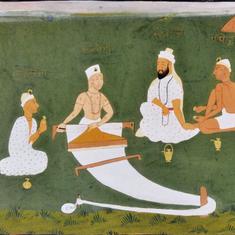“You cannot lose seven wickets for 11 runs and expect to win Tests,” Virat Kohli had said in Pune, in what was a scathing assessment of India’s 333-run defeat in the first Test.
It has been some time since that loss came to pass and, yet, Australia had a vice-like grip on proceedings in this series. The second Test in Bengaluru rolled by. Despite India winning the toss on a topsy-turvy pitch, they never really let go, coming at the hosts again and again, and then again, so much so the match hung in balance going into this day four at the M Chinnaswamy Stadium.
That is the peculiar thing about Australia. They do not play nice like New Zealand do. They wait, with bated breath, and sneak up behind you, and lay on that stranglehold. They are patient like South Africa, but they do not choke. They have this wherewithal to make a comeback at any stage of the game, irrespective of format.
And they do not play gentlemanly like England. They will talk, nose you in, and pick a fight, even cry foul when you do it back to them, all in the name of fair play and winning a game of cricket. Australia are bloody tough to beat, and this second Test in Bengaluru will always stand testimonial to this statement.
Just look at how the morning began, with Cheteshwar Pujara and Ajinkya Rahane looking in complete control. Perhaps they didn’t take a night’s rest in between, and simply carried on their overnight partnership. Heavy rain on Monday evening had livened up the wicket, but it wasn’t until the second new ball arrived that things started happening.
“Pace will play an important role going ahead,” Josh Hazlewood had opined at the end of day three. It was a learned opinion, seeing how the pitch had shaped up from day one, the cracks widening further as the match progressed. Batting on this wicket, when fresh, had been tough and Australia had made the first inroads when India lost the advantage of batting first. They were always playing catch up after getting bundled out for 189 in the first innings.
This match had ebbed and flowed in the shadow of that low Indian score ever since. Through the first three days, it was a dogfight. India choking Australia on day two, not letting them run amok, and containing their scoring. On day three, the visitors returned the favour again, and it was only with that Pujara-Rahane partnership that momentum shifted slightly in India’s favour. For the first time in this series, the hosts had their noses in front.
Two collapses and two chokes
In this spectacle of a Test, then, day four held its own charm. It was again about two collapses – one Indian, the other Australian – and two chokes that dried up runs, giving us a slugfest of epic proportions. Almost as if two kids had found the appetite to wrestle in mud for three days, and they were back for one last bout, winner takes all.
True to Hazlewood’s words, that second new ball started it all. Mitchell Starc struck twice, sending back Rahane and cleaning up any celebratory haze left from that triple hundred in Karun Nair’s head. At the other end, Hazlewood gobbled up the tail. India lost their last six wickets for 36 runs, and fell way short of a 225-plus target.
At this juncture, it is important to evaluate just how Australia have hurt India. In Pune, the hosts played with five full-time batsmen plus Wriddhiman Saha. Their five bowlers contributed 11 and 16 in two innings. Here, it was six batsmen with Saha, and the contributions from four bowlers were 10 and 13.
From West Indies to England, in the past three Test series (excluding Bangladesh), a lot was said about the lower-order’s contribution to the team’s cause. That aspect seems lost herein, as Australia have managed to hurt India where it hurts most. In turn, it also forces Kohli to drop an extra bowler. Yes, the pitches have been tougher too, and on these tracks, you probably don’t need a fifth bowling option, but that is beside the point.
It doesn’t allow you to experiment, like sending Ravindra Jadeja up the order to blunt Nathan Lyon. He could have scored extra crucial runs today, something India forfeited when they gambled on day three. It places more responsibility on someone like Umesh Yadav, and he ought to be pulled up for that horrendous shot against Hazlewood. India fell short by at least 50 runs of where they wanted to be, and it crucially removed room for patience in this fourth innings.
Holding back Jadeja
This, in turn, meant that Kohli had to be more pro-active in choosing his bowling options. And yet, he decided to mull over it, holding back Jadeja until he felt plucky enough to counter the middle- and lower-order batsmen. This ploy of not bowling left-arm spinners to left-arm batsmen in Test cricket is seriously over-rated: just ask Alastair Cook how Jadeja dismissed him six times in the recently concluded Test series.
It was appalling that, in a run-chase of 188 runs, Jadeja only came on to bowl in the 13th over. The scoreboard read 59/2 at that stage – nearly a third of the target was gone. This is where reading that same scorecard is vital: Jadeja’s spell hereafter read 8-5-3-1.
He choked runs off the middle order, even as Steve Smith and Shaun Marsh tried to break free. Should he have been brought on immediately after Matt Renshaw (who played him very well in Pune) got out? Yes. Will Kohli do so in Ranchi? That is a debate for another day.
Meanwhile, at this juncture, the difference between victory and defeat was the Australian skipper himself. After his master-class century in Pune, this was another powerhouse batting effort from Smith. Kohli brought on Yadav, and he got reverse swing going. Smith, in turn, watched the ball late and dug it out repeatedly. He was in it for the long haul, even if it meant dragging his team across the finish line.
This was trench warfare, and Smith was ready to get bloodied. Eventually it told on him, as he made that error in judgment of referring a DRS call to the dressing room. We will hear more of it as the series progresses, but the underlying point is Smith’s dismissal broke the camel’s proverbial back. Thereafter, it was a matter of squeezing out runs, and Australia wilted. They lost 6 wickets for 11 runs.
As Kohli had said, you don’t win Tests with such collapses.










